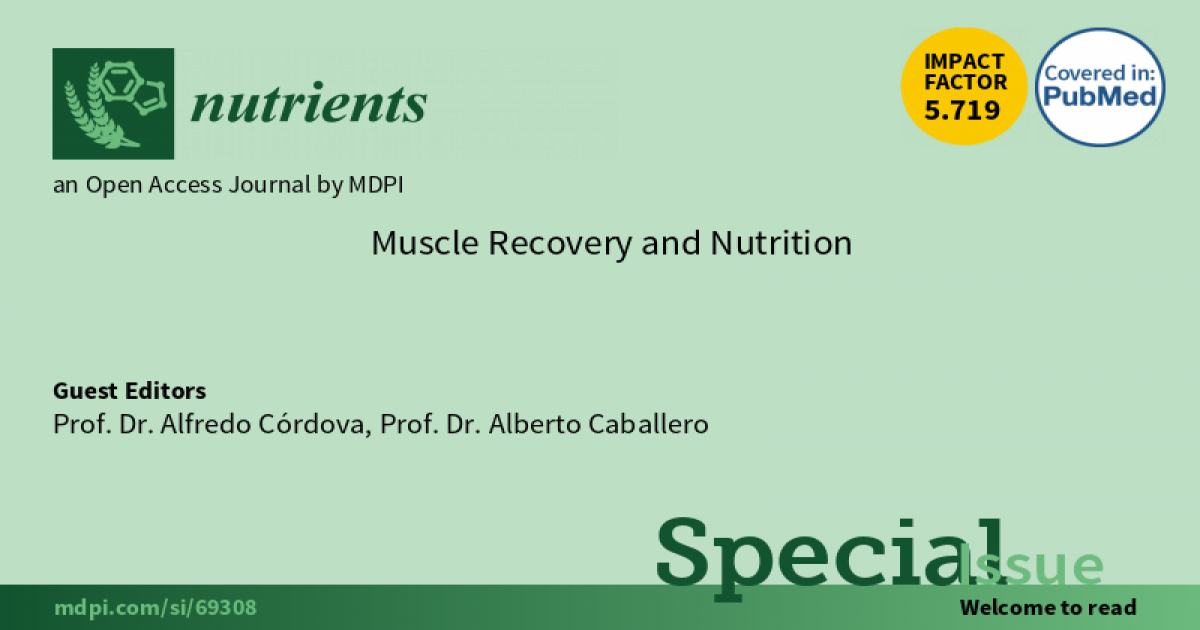Muscle Recovery and Nutrition
A special issue of Nutrients (ISSN 2072-6643). This special issue belongs to the section "Sports Nutrition".
Deadline for manuscript submissions: closed (7 December 2021) | Viewed by 116634

Special Issue Editors
Interests: sport medicine; athletes; sports nutrition; nutrition knowledge; trainers
Special Issues, Collections and Topics in MDPI journals
Interests: muscle damage; performance; personal diets; sport disciplines
Special Issues, Collections and Topics in MDPI journals
Special Issue Information
Dear Colleagues,
Recovery strategies, both in normal people and in athletes, must be aimed at the main causes of fatigue. Any physical activity involves an increase in metabolism and the functionality of the functional systems of our body. In this sense, numerous nutritional resources have been described to promote muscle anabolism. There are many studies on proteins, amino acids, immediate principles and metabolic regulators (vitamins and minerals) that have demonstrated their importance and effectiveness in muscle recovery. But, it is key to take into account the guidelines, including quantity, time and nutritional composition required at all times to maximize their effectiveness. Therefore, having a good quality of life means following adequate nutrition and regular physical activity. This combination also reduces the risk of many disease (mainly cardiovascular and metabolic) while increasing our levels of physical performance. These aspects are also very important in the aged people and the sarcopenia syndrome. Therefore, and focusing the subject more in the field of physical activity, whether professional or recreational, the influence of nutrition on the health, performance and recovery of the subject is undoubted. Consequently, nutritional strategies, hydration, or diet or a well programmed and regulated physical activity can be effective in the systemic capacity to counteract the mechanisms and effects of fatigue, and improve the physical condition and the quality of life.
Prof. Dr. Alfredo Córdova
Prof. Dr. Alberto Caballero
Guest Editors
Manuscript Submission Information
Manuscripts should be submitted online at www.mdpi.com by registering and logging in to this website. Once you are registered, click here to go to the submission form. Manuscripts can be submitted until the deadline. All submissions that pass pre-check are peer-reviewed. Accepted papers will be published continuously in the journal (as soon as accepted) and will be listed together on the special issue website. Research articles, review articles as well as short communications are invited. For planned papers, a title and short abstract (about 250 words) can be sent to the Editorial Office for assessment.
Submitted manuscripts should not have been published previously, nor be under consideration for publication elsewhere (except conference proceedings papers). All manuscripts are thoroughly refereed through a single-blind peer-review process. A guide for authors and other relevant information for submission of manuscripts is available on the Instructions for Authors page. Nutrients is an international peer-reviewed open access semimonthly journal published by MDPI.
Please visit the Instructions for Authors page before submitting a manuscript. The Article Processing Charge (APC) for publication in this open access journal is 2900 CHF (Swiss Francs). Submitted papers should be well formatted and use good English. Authors may use MDPI's English editing service prior to publication or during author revisions.
Keywords
- Exercise
- Physical activity
- nutrition
- recovery
- sport
- skeletal muscle
- performance
- dietary supplements
Benefits of Publishing in a Special Issue
- Ease of navigation: Grouping papers by topic helps scholars navigate broad scope journals more efficiently.
- Greater discoverability: Special Issues support the reach and impact of scientific research. Articles in Special Issues are more discoverable and cited more frequently.
- Expansion of research network: Special Issues facilitate connections among authors, fostering scientific collaborations.
- External promotion: Articles in Special Issues are often promoted through the journal's social media, increasing their visibility.
- Reprint: MDPI Books provides the opportunity to republish successful Special Issues in book format, both online and in print.
Further information on MDPI's Special Issue policies can be found here.







